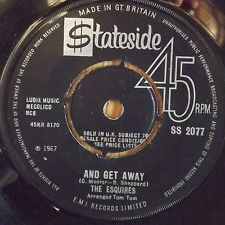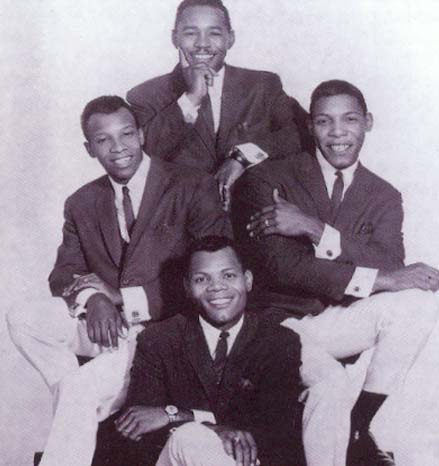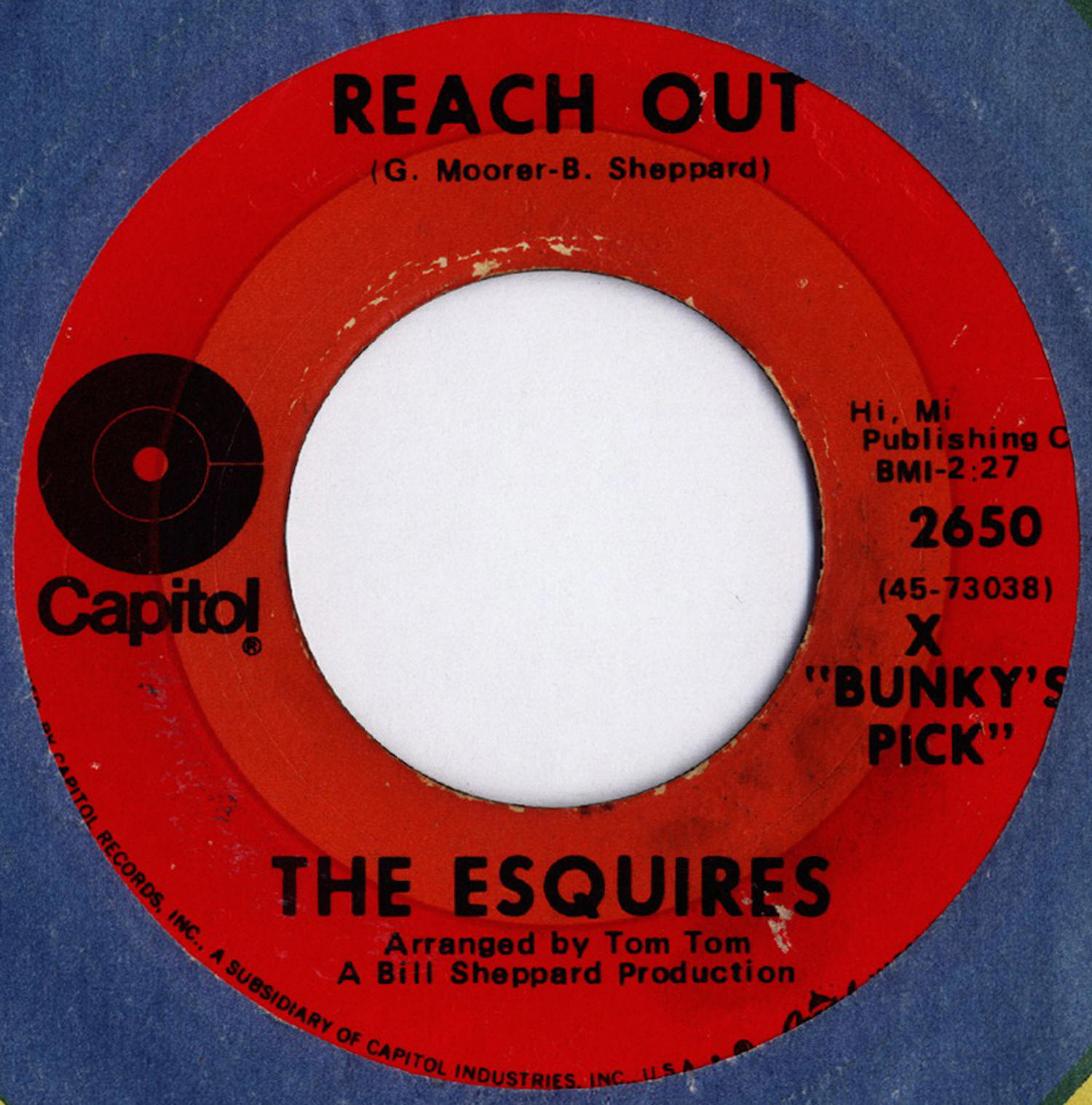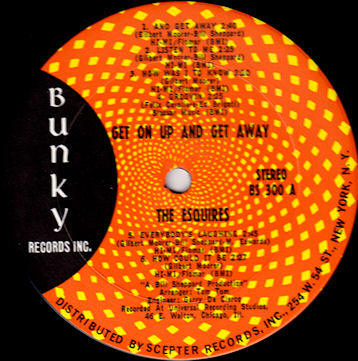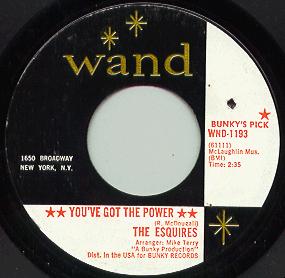Welcome To Northernsoultrain
Esquires
One of the most underrated talented R&B groups to come out of the soul explosion during the mid 60's were, The Esquires. From Milwaukee, Wisconsin, brothers Gilbert and Alvis Moorer along with their sister Betty, formed the group, in 1957, while attending North Division High School. Various kids in their neighborhood would audition but soon drift in and out of the group.
In 1965, 8 years later, The Esquires now consisted of Gilbert and Alvis Moorer, Sam Pace, and Shawn Taylor. Betty Moorer had dropped out. In 1966, the group saw that Milwaukee had little recording opportunities to get their feet wet, so they decided to try their luck in Chicago.
The Esquires went to Curtis Mayfield who just formed his new label,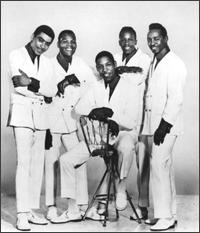 ' Windy C'. They decided to help Curtis run the label, hoping to get a deal. Opportunity came knocking when they ran into a local producer named Bunky Sheppard who ran the Constellation label that included such artists as Gene Chandler, Nolan Chance etc; the group recorded one song for Constellation entitled, "Things Won't Be The Same", in 1966.
' Windy C'. They decided to help Curtis run the label, hoping to get a deal. Opportunity came knocking when they ran into a local producer named Bunky Sheppard who ran the Constellation label that included such artists as Gene Chandler, Nolan Chance etc; the group recorded one song for Constellation entitled, "Things Won't Be The Same", in 1966.
The Esquires presented two demo songs that lead singer Gilbert Moorer composed entitled, 'Listen To Me', and 'Get On Up'. Bill Sheppard listened to both songs and felt that ' Get On Up' had the potential to become a hit but something was missing and had his old friend and bass singer Millard Edwards from their former doo-wop group, The Sheppards, to take a listen. Millard solve the problem saying the bass part was missing from the song and volunteered to sing bass on the song. He later would join the group.
Both 'Get On Up' and ' Listen To Me' was recorded on Bill Sheppard's newly formed 'Bunky' label in 1967 and was distributed nationally on New York's legendary Scepter / Wand label, home of such distinguished artists as The Shirelles, Tommy Hunt, Chuck Jackson, Maxine Brown, Dionne Warwick, King Curtis, Isley Brothers, The Rocky Fellers, The Kingsmen, Roy Head, Ronnie Millsap and B.J. Thomas.
With its flashy horns and machine gun conga rhythm opening, 'Get On Up' b/w ' Listen To Me' became one of the biggest dance records of the mid 60's Boogaloo era, hitting No 3 on Billboard's R&B Singles on Oct 7, 1967 and No 11 on the Pop Singles on Oct 21 and sold an instant million copies!
Their LP 'Get On Up And Get Away' was released in 1968. The album front cover has a very interesting collage of pictures featuring the Esquires along with label mates, Chuck Jackson and Maxine Brown. This outstanding album features Alvis Moorer's rare and wonderful lead on the 'Young Rascals' spring-summer hit of 1967, "Groovin".
With great choreography and stage presence, The Esquires became the most demanding group during the1960's, appearing in such prestige places as, the Uptown in Philadelphia, the Regal in Chicago, the Howard in Washington, the Royal in Baltimore and the world famous Apollo Theater in New York. I caught their appearance at the Apollo in Sept of 1967. The show featured, Martha & The Vandellas, Jimmy Ruffin, The Van Dykes, The Fabulous Peps, and Jimmy Pelham.
The Esquires charted with their last hits featured on the Bunky label with "You Say " (No 41 R&B Singles March 30, 1968), "Why Can't I Stop" (No 48 R&B Singles June 15, 1968) and the heart -drenched "I Know I Can" b/w "How Could It Be", released July 1968.
Bunky Records began to falter, so the Esquires signed with its distributor, Wand Records of New York in November 1968. The label would release two singles, " You've Got The Power" (No 29 R&B Singles Dec 21, 1968) and " I Don't Know" b/w " Part Angel" (No 37 R&B April 5, 1969).
The Esquires left Wand Records and signed with Bunky Sheppard's new B&G label and released one cut entitled, "Ain't No Reason", backed with my favorite, " Baba-Daba-Dop (Ain't Gonna Give It Up)" in late 69'. The group signed momentarily with Capital Records that same year and waxed, "Reach Out", in 1970.
Esquires
Millard Edwards left the group for the jeweler business, in 1970, reuniting the group with Shawn Taylor, who was replaced in 1967. The Esquires signed on Lamarr Records, a small independent label in Chicago operated by Burgess and Walter Gardner and in early 1971, charted their first big hit entitled, " Girls In The City" composed by the late Tony Hester, (who becoming a successful songwriter for the Dramatics in the 70's), backed with "Ain't Gonna Give It Up (Baba-Dapa-Dop)", hit No 18 on the R&B Singles charts on April 17, 1971.
The Esquires signed on Lamarr Records, a small independent label in Chicago operated by Burgess and Walter Gardner and in early 1971, charted their first big hit entitled, " Girls In The City" composed by the late Tony Hester, (who becoming a successful songwriter for the Dramatics in the 70's), backed with "Ain't Gonna Give It Up (Baba-Dapa-Dop)", hit No 18 on the R&B Singles charts on April 17, 1971
The group would return to record one last charted hit with a remake of their 1967 classic, "Get On Up" re-titled, "Get On Up 76", adding a fake audience to create an effect. Released on the Ju-Par label, the song hit No 62 in late 1976, b/w "Dancing Disco".
The Esquires continued to perform throughout the 90's overseas in the U.K. soul scene, with new members added to keep their sound fresh and exciting.
The Esquires were a very innovative group that interjected street corner falsetto doo-wop into world of Soul music, during its heyday of the mid 1960's. They should be honored for the wonderful contribution they helped created in the history of music. Continue to support them, so their history won't be forced to graze in forgotten musical pastures of the past.
In 1965, 8 years later, The Esquires now consisted of Gilbert and Alvis Moorer, Sam Pace, and Shawn Taylor. Betty Moorer had dropped out. In 1966, the group saw that Milwaukee had little recording opportunities to get their feet wet, so they decided to try their luck in Chicago.
The Esquires went to Curtis Mayfield who just formed his new label,
 ' Windy C'. They decided to help Curtis run the label, hoping to get a deal. Opportunity came knocking when they ran into a local producer named Bunky Sheppard who ran the Constellation label that included such artists as Gene Chandler, Nolan Chance etc; the group recorded one song for Constellation entitled, "Things Won't Be The Same", in 1966.
' Windy C'. They decided to help Curtis run the label, hoping to get a deal. Opportunity came knocking when they ran into a local producer named Bunky Sheppard who ran the Constellation label that included such artists as Gene Chandler, Nolan Chance etc; the group recorded one song for Constellation entitled, "Things Won't Be The Same", in 1966.The Esquires presented two demo songs that lead singer Gilbert Moorer composed entitled, 'Listen To Me', and 'Get On Up'. Bill Sheppard listened to both songs and felt that ' Get On Up' had the potential to become a hit but something was missing and had his old friend and bass singer Millard Edwards from their former doo-wop group, The Sheppards, to take a listen. Millard solve the problem saying the bass part was missing from the song and volunteered to sing bass on the song. He later would join the group.
Both 'Get On Up' and ' Listen To Me' was recorded on Bill Sheppard's newly formed 'Bunky' label in 1967 and was distributed nationally on New York's legendary Scepter / Wand label, home of such distinguished artists as The Shirelles, Tommy Hunt, Chuck Jackson, Maxine Brown, Dionne Warwick, King Curtis, Isley Brothers, The Rocky Fellers, The Kingsmen, Roy Head, Ronnie Millsap and B.J. Thomas.
With its flashy horns and machine gun conga rhythm opening, 'Get On Up' b/w ' Listen To Me' became one of the biggest dance records of the mid 60's Boogaloo era, hitting No 3 on Billboard's R&B Singles on Oct 7, 1967 and No 11 on the Pop Singles on Oct 21 and sold an instant million copies!
Their LP 'Get On Up And Get Away' was released in 1968. The album front cover has a very interesting collage of pictures featuring the Esquires along with label mates, Chuck Jackson and Maxine Brown. This outstanding album features Alvis Moorer's rare and wonderful lead on the 'Young Rascals' spring-summer hit of 1967, "Groovin".
With great choreography and stage presence, The Esquires became the most demanding group during the1960's, appearing in such prestige places as, the Uptown in Philadelphia, the Regal in Chicago, the Howard in Washington, the Royal in Baltimore and the world famous Apollo Theater in New York. I caught their appearance at the Apollo in Sept of 1967. The show featured, Martha & The Vandellas, Jimmy Ruffin, The Van Dykes, The Fabulous Peps, and Jimmy Pelham.
The Esquires charted with their last hits featured on the Bunky label with "You Say " (No 41 R&B Singles March 30, 1968), "Why Can't I Stop" (No 48 R&B Singles June 15, 1968) and the heart -drenched "I Know I Can" b/w "How Could It Be", released July 1968.
Bunky Records began to falter, so the Esquires signed with its distributor, Wand Records of New York in November 1968. The label would release two singles, " You've Got The Power" (No 29 R&B Singles Dec 21, 1968) and " I Don't Know" b/w " Part Angel" (No 37 R&B April 5, 1969).
The Esquires left Wand Records and signed with Bunky Sheppard's new B&G label and released one cut entitled, "Ain't No Reason", backed with my favorite, " Baba-Daba-Dop (Ain't Gonna Give It Up)" in late 69'. The group signed momentarily with Capital Records that same year and waxed, "Reach Out", in 1970.
Millard Edwards left the group for the jeweler business, in 1970, reuniting the group with Shawn Taylor, who was replaced in 1967. The Esquires signed on Lamarr Records, a small independent label in Chicago operated by Burgess and Walter Gardner and in early 1971, charted their first big hit entitled, " Girls In The City" composed by the late Tony Hester, (who becoming a successful songwriter for the Dramatics in the 70's), backed with "Ain't Gonna Give It Up (Baba-Dapa-Dop)", hit No 18 on the R&B Singles charts on April 17, 1971.
The Esquires signed on Lamarr Records, a small independent label in Chicago operated by Burgess and Walter Gardner and in early 1971, charted their first big hit entitled, " Girls In The City" composed by the late Tony Hester, (who becoming a successful songwriter for the Dramatics in the 70's), backed with "Ain't Gonna Give It Up (Baba-Dapa-Dop)", hit No 18 on the R&B Singles charts on April 17, 1971
The group would return to record one last charted hit with a remake of their 1967 classic, "Get On Up" re-titled, "Get On Up 76", adding a fake audience to create an effect. Released on the Ju-Par label, the song hit No 62 in late 1976, b/w "Dancing Disco".
The Esquires continued to perform throughout the 90's overseas in the U.K. soul scene, with new members added to keep their sound fresh and exciting.
The Esquires were a very innovative group that interjected street corner falsetto doo-wop into world of Soul music, during its heyday of the mid 1960's. They should be honored for the wonderful contribution they helped created in the history of music. Continue to support them, so their history won't be forced to graze in forgotten musical pastures of the past.
